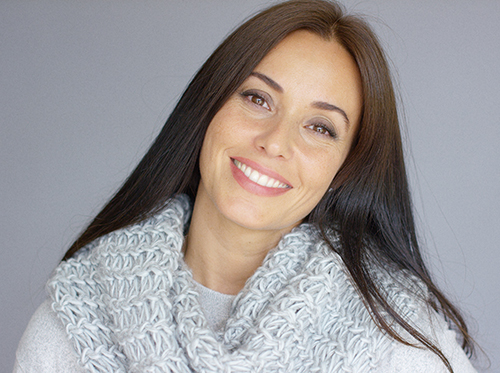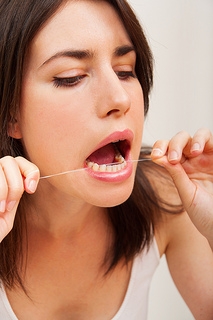
You might have noticed that the dental aisle of your drugstore is larger than ever, with more options than ever for getting the spaces between your teeth their cleanest. Flosses made with different shapes, materials, and coatings. Wooden dental sticks. Flexible plastic picks. Tiny interproximal brushes. Water flossers. With all these choices, what’s a conscientious person to do?
- Find What Works Best for You!
We’ve come a long way from the one-size-fits-all floss of our grandparents. Today’s plaque-removing tools are designed to make interdental cleaning easier and more efficient for users with a variety of different needs.
Flossing properly is a very effective way to get rid of the plaque that builds up between your teeth and along your gum line—not to mention the food particles which your brush may have missed. And now there are options to suit both your needs and your preferences.
Modern flosses come waxed or unwaxed, flat or rounded, made of natural or synthetic material, flavored or unflavored. There are flosses designed for specifically for braces and eco-friendly, biodegradable flosses. If you’re not happy with your regular floss, a different size, material, or texture might make all the difference.
Even with all these choices, though, flosses don’t always suit everyone. Luckily, if you’ve had trouble with floss, you have many other options available for interdental cleaning:
These tiny, handled tools hold a piece of dental floss in their curved end. You can direct the floss to the perfect spot, which is especially useful if you’re having trouble reaching your back teeth or have mobility issues. Floss picks can be disposable or refillable, and come in different sizes to accommodate adults and children.
Back in the day, toothpicks were the go-to for dislodging food particles. But they weren’t designed for gum health and safety. Today, we have gentler, more efficient options for those of us who like the ease of using a pick and the convenience of being able to clean our teeth at work, at school, or on the go.
Triangular wooden picks are tapered to fit between the teeth and massage the gum line as they scour plaque from tooth enamel. Soft plastic picks are popular because their flexible tips fit easily in between the teeth, while their texture provides gentle scrubbing for your tooth enamel.
Big name; tiny brush. These little cone-shaped brushes come in various sizes so they can fit snugly and comfortably between teeth whether widely or narrowly spaced. They’re especially handy for getting around wires if you wear braces.
These high-tech tools provide a pulsing stream of water to clean between the teeth. They’re particularly helpful for those with mobility issues and those with traditional or lingual braces. To make sure you’re getting the job done, choose a model with a dental seal of approval, which means it has been tested for safety and effectiveness.
With so many options, you can sample different flossing alternatives until you find the one that works best for you.
No matter which product you choose, the key to effective plaque removal is your technique. You need to be thorough. You need to be gentle enough to protect your delicate gums, but not so gentle that you don’t remove any plaque.
Whichever method you choose, carefully follow directions to get optimal cleaning benefits while protecting tooth enamel and gum tissue. And remember, you have an expert ally in your corner—Dr. Pohl and your team at Buttermilk Dentistry! If your hygienist is seeing a lot of plaque buildup at your next exam, ask for tips to improve your interdental cleaning technique and suggestions for the best products to accommodate your specific needs.
Even after deciding on the best tool and technique, your teeth and gums won’t benefit from your research if your floss or pick or brush or water flosser is languishing in the medicine cabinet. While dentists recommend flossing at least once each day, if you have braces or a tendency toward cavities or gum disease, your dentist might recommend flossing more often.
Why is flossing so important? Even with the best brushing technique, it can be hard to reach plaque and food particles caught between the teeth and near the gum line. Removing plaque from between teeth can help prevent cavities, and it’s especially important for gum health.
Plaque and tartar are extremely irritating to gum tissue. This irritation causes inflammation, and you’ll soon start to see the first signs of gingivitis (early gum disease)—swelling, redness, bleeding, bad breath—when flossing is hit or miss. Over time, left untreated, gingivitis can lead to periodontitis, a serious form of gum disease that can cause tooth and bone loss.
When caught early, you can often reverse the irritation, inflammation, and unpleasant symptoms of gingivitis with a week or two of careful brushing and flossing. If your gums are bothering you despite your careful cleaning, it’s time to visit our Crescent Springs dental office. There are lots of options available for getting your teeth their cleanest—but you have only one smile!







 Website Powered by Sesame 24-7™
Website Powered by Sesame 24-7™